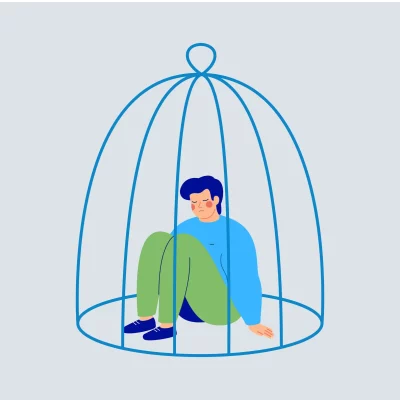Have you ever lost a loved one and felt your world has stopped?
Have you been struggling to cope with the loss, feeling numb, detached from reality, and unable to function?
Do you ask yourself, “Will I ever stop grieving?”
If so, you may be experiencing symptoms of Prolonged Grief Disorder.
Prolonged Grief Disorder (PGD) is a complex mental health condition that can be difficult to describe. This disorder is characterized by intense and persistent feelings of grief, sadness, and loss that last for months or even years after the death of a loved one. This type of grief can feel overwhelming and all-consuming, affecting every aspect of a person’s life.
An estimated 10% of bereaved adults experience PGD. Although this disorder is not prevalent, you are not alone. In this post, we will discuss the difference between normal grief and PGD, signs and symptoms, treatment options, and understanding when you need the help of a trained counselor to progress through the stages of grief and find lasting relief.
Normal grief vs PGD: what are the differences?
While you go through the six stages of grief, you may get stuck in one stage for a while and wonder if you are experiencing normal or prolonged grief. Here are some key differences to identify if you have a more complex grieving experience.
Normal grief:
- Is a natural response to loss and can last for weeks or months.
- Includes intense emotions at first, but those affected eventually accept the loss and adapt.
- Typically, does not interfere with daily functioning.
- Can be managed by seeking support from loved ones or a therapist.
Prolonged Grief:
- Can persist for years.
- Does not subside over time, and there is difficulty moving forward.
- Can make it challenging to maintain relationships, work, and participate in activities.
- Often requires specialized treatment and support.
While both normal grief and Prolonged Grief Disorder can involve symptoms such as sadness, guilt, and avoidance, the severity and persistence of these symptoms are much more significant in PGD.
8 Causes of Prolonged Grief Disorder:
Prolonged Grief Disorder is not a typical or expected response to loss, like the acute grief that most people experience after the death of a loved one. It is a condition that occurs when someone has difficulty moving forward and adjusting to life without their loved one.
PGD can happen for a variety of reasons, including:
- The death was sudden and unexpected
- The person had an intense or complicated relationship with the deceased
- The person has a history of mental health issues, such as depression or anxiety
- The person has a history of substance abuse
- The person lacks a strong support system
Other causes that can contribute to PGD:
- The loss of a child or spouse
- Multiple losses in a short period of time
- A traumatic death, such as suicide or homicide
Whether you have experienced one or multiple causes of grief and loss, your experience with prolonged grief can be deeply intense. Let’s discuss what the symptoms of prolonged grief can look like.
Signs and Symptoms of Prolonged Grief Disorder
The symptoms of PGD can vary from person to person, but some common signs include:
- Intense and persistent feelings of sadness, guilt, anger, or numbness
- Difficulty accepting the death or loss and moving forward
- Preoccupation with thoughts or memories of the deceased
- Avoiding reminders of the person who died
- Difficulty participating in daily activities and maintaining relationships
These symptoms can be incredibly challenging because they may not appear until months after the loss, making it difficult for loved ones to understand what is happening. To better understand PGD, let’s go deeper into the emotional responses of common symptoms in this disorder.
Understanding The Rollercoaster of Emotions
One of the most striking features of PGD is the rollercoaster of emotions that people experience. One moment, they may feel completely numb and disconnected from their feelings; the next, they may be overwhelmed with intense sadness or anger. This constant fluctuation can be exhausting and make it difficult to predict how one will feel at any moment.
Intense Longing
One of the defining features of PGD is a deep longing for the person who has passed away. This longing can manifest as an intense yearning, pining, or even physical pain in response to thoughts or reminders of the deceased loved one. The feeling of emptiness and longing can be all-consuming, making it difficult to focus on anything else.
Guilt and Self-Blame
Many people with PGD also experience intense guilt and self-blame. They may believe that they could have prevented their loved one’s death or that they are somehow responsible for being unable to save them. These feelings of guilt can be overwhelming, leading to a decreased sense of self-worth and a constant feeling of being at fault.
Isolation and Withdrawal
Grief can be an intensely personal experience, so people with PGD may withdraw from their social connections and isolate themselves. They may feel like they are burdening others with their pain or that no one understands what they are going through. This isolation can further exacerbate feelings of loneliness and make it difficult to find support.
Difficulty Moving On
One of the most challenging aspects of PGD is difficulty moving on with life after a loss. People with this disorder may struggle to find meaning or purpose without their loved one and feel like they are betraying them by trying to live a happy life. This can lead to a cycle of guilt and longing, making it challenging to find closure.
Coexisting Conditions of PGD
PGD is often accompanied by other mental health conditions, such as depression, anxiety, and post-traumatic stress disorder (PTSD). These coexisting conditions can make coping with grief even more challenging and require additional treatment.
When you are exhausted by the effects of anxiety, depression, or PTSD, your pain and stress thresholds are lowered. Adding a devastating loss to your already weakened stress threshold means you are less able to process grief healthily.
Be kind to yourself if you have a secondary or coexisting condition that amplifies your grieving process. Despite what we all pretend to be, we are not superheroes who can ignore the human experience. If you are experiencing PGD while coping with another mental health condition, what you are experiencing is normal, and your symptoms can be treated.
How to Treat Prolonged Grief Disorder
While everyone experiences grief differently, standard, scientifically proven treatments are available to help those with PGD cope and process their grief.
Some effective Prolonged Grief Disorder treatment options include:
- Cognitive-behavioral therapy (CBT): This therapy can help individuals identify and change negative thought patterns and behaviors contributing to their grieving experience.
- Medication: Antidepressants or anti-anxiety medication may be prescribed to help manage symptoms of PGD.
- Support groups: Connecting with others experiencing similar grief can provide a sense of understanding and comfort.
- Grief counseling: Seeking support from a licensed therapist can provide a safe space for individuals to process their emotions and learn coping skills.
Although these options are “standard,” they can look very different for each person. Your counselor or doctor will help you understand your options and decide which options work best for you. Typically, those who participate in more than one treatment option tend to experience better relief of symptoms.
Do I Need a Counselor to Overcome Prolonged Grief Disorder?
Because of the complex nature of PGD and the coexisting conditions that often accompany it, connecting with a trained and certified counselor equipped to treat these issues is often necessary to see improvements and find relief from debilitating symptoms.
Counselors create personalized treatment plans based on your history, mental health conditions, and personal goals. They also utilize different techniques to help process painful experiences and offer additional treatments to support your healing process.
Although there may be some stigma about mental health and grief, counseling may be the missing link needed to overcome the intense emotions of PGD so you can move on in the grieving process healthily. Counselors know how uncomfortable it can be to talk about difficult and emotional things, so together, they work with you to create a safe and comfortable space so you feel free to be open about what is on your mind.
Remember: A counselor’s job is to help you process what plagues you, offer coping techniques, and a personalized plan with treatment options so you can find relief. Therapy is a private experience but is often necessary to relieve symptoms and work through trauma. There is no shame in needing help from those trained to help.
Conclusion
Prolonged Grief Disorder (PGD) is characterized by intense and persistent feelings of grief, sadness, and loss that last for months or even years after the death of a loved one. These symptoms often interfere with your quality of life and ability to complete daily tasks. These symptoms can be amplified if you have a coexisting mental health condition like anxiety, depression, or PTSD.
It’s important to remember that everyone grieves differently, and there is no “right” way to cope with a loss. It’s essential to find what works best for you and be patient and kind to yourself as you navigate your grief. With time, support, and self-care, finding a sense of peace after losing a loved one is possible.
If you are ready to overcome the debilitating effects of Prolonged Grief Disorder, call us at (833)-274-heal or Get Started here. Remember, healing takes time, but it is possible, so start your healing journey today.








